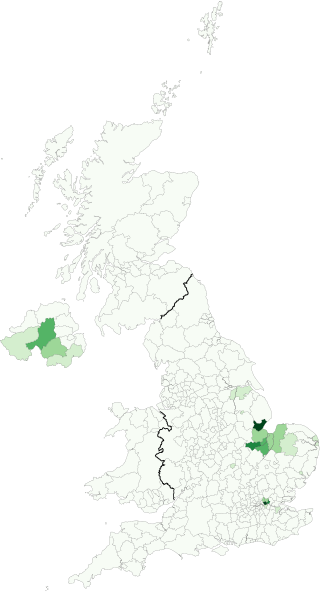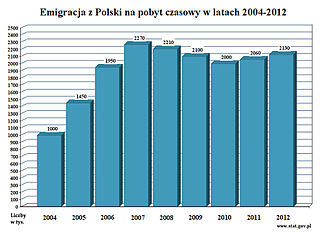
British Turks or Turks in the United Kingdom are Turkish people who have immigrated to the United Kingdom. However, the term may also refer to British-born persons who have Turkish parents or who have a Turkish ancestral background.
Armenians in Bulgaria are the fifth largest minority, after Russians, in the country, numbering 6,552 according to the 2011 census, down from 10,832 in 2001, while Armenian organizations estimate up to 80,000. Armenians have lived in the Balkans since no later than the 5th century, when they moved there as part of the Byzantine cavalry. Since then, the Armenians have had a continuous presence in Bulgarian lands and have often played an important part in the history of Bulgaria from early Medieval times until the present.

Italians in the United Kingdom, also known as British Italians or colloquially Britalians, are citizens and / or residents of the United Kingdom who are fully or partially of Italian descent, whose ancestors were Italians who emigrated to the United Kingdom during the Italian diaspora. The phrase may refer to someone born in the United Kingdom of Italian descent, someone who has emigrated from Italy to the United Kingdom, or someone born elsewhere, who is of Italian descent and has migrated to the UK. More specific terms used to describe Italians in the United Kingdom include: Italian English, Italian Scots, and Italian Welsh.
Russians in the United Kingdom are Russians, or the persons born in the Russian Empire, the Soviet Union or the Russian Federation, who are or were citizens of or residents of the United Kingdom.

Romanians in the United Kingdom refers to Romanian immigrants in the United Kingdom, both citizens and non-citizens, along with British citizens of Romanian ancestry. The number of Romanian-born people resident in the UK has risen from 83,168 at the time of the 2011 United Kingdom census to an estimated 539,000 in England and Wales alone in 2021.
Bolivians in the United Kingdom form a fairly small group, with 3,765 Bolivian-born people living in the UK according to the 2011 Census.
Baltic people in the United Kingdom are those born or raised in the UK, or residents, who are of ethnically Baltic, meaning Latvian or Lithuanian, origin.
Maltese people in the United Kingdom are citizens or residents of the United Kingdom who originate from the country of Malta.

The Macedonian diaspora consists of ethnic Macedonian emigrants and their descendants in countries such as Australia, Italy, the United Kingdom, Germany, New Zealand, Canada, the United States and others. A 1964 estimate put the number of Macedonian emigrants at over 580,000.
Egyptians in the United Kingdom or Egyptian Britons are Egyptian citizens or people of Egyptian ancestry who are citizens or residents of the United Kingdom.
The Egyptian diaspora consists of citizens of Egypt abroad sharing a common culture and Egyptian Arabic language. The phenomenon of Egyptians emigrating from Egypt was rare until Gamal Abdel Nasser came to power after overthrowing the monarchy in 1952. Before then, Cleland's 1936 declaration remained valid, that "Egyptians have the reputation of preferring their own soil. Few ever leave except to study or travel; and they always return... Egyptians do not emigrate".
The British diaspora consists of people of English, Scottish, Welsh, Northern Irish, Cornish, Manx and Channel Islands ancestral descent who live outside of the United Kingdom and its Crown Dependencies.

New Zealanders in the United Kingdom are citizens or residents of the United Kingdom who originate from New Zealand.
Turks in Italy, also referred to as Turkish Italians or Italian Turks, refers to Italian citizens of full or partial Turkish origin. Although some Turks came to Italy as Ottoman migrants, the majority of Italian Turks descend from the Republic of Turkey; moreover, there has also been Turkish migration from other post-Ottoman countries including ethnic Turkish communities that have moved to Italy from the Balkans, the island of Cyprus, North Africa and, more recently, Iraq and Syria.

Bulgarian Canadians are Canadian citizens or residents from Bulgaria or people of Bulgarian descent. According to the 2021 Census there were 33,085 Canadians who claimed Bulgarian ancestry, an increase compared to the 27,260 of the 2006 Census.

Bulgarian Australians are Australian citizens of Bulgarian ancestry. According to the 2006 Australian census, 2,680 residents of Australia were born in Bulgaria. Of these, 850 lived in New South Wales, 840 in Victoria, 340 in Queensland and 340 in South Australia. Some 4,870 people indicated full or partial Bulgarian ancestry.

Lithuanians in the United Kingdom include individuals born in Lithuania who have migrated to the UK, among them Lithuanian citizens of Russian descent and Polish Lithuanian citizens, as well as their British-born descendants. The 2011 UK Census recorded 95,730 Lithuanian-born residents in England, 1,353 in Wales, 4,287 in Scotland, and 7,341 in Northern Ireland. The previous, 2001 UK Census, had recorded 4,363 Lithuanian-born residents. The Office for National Statistics estimates that 144,000 Lithuanian-born immigrants were resident in the UK in 2013.
Swedes in the United Kingdom or British Swedes are immigrants from Sweden living in the United Kingdom as well as their British-born descendants. Although only around 38,000 Swedish-born people live in the UK, millions of Britons have some degree of Scandinavian ancestry that dates back over 1,000 years to the Viking invasion of Great Britain. The Swedish community in the UK is amongst the largest in the Swedish diaspora; in 2001 only the United States, Norway and Finland within the OECD had larger Swedish-born populations.

Since the fall of communism in 1989, the nature of migration to and from Poland has been in flux. After Poland's accession to the European Union and accession to the Schengen Area in particular, a significant number of Poles, estimated at over two million, have emigrated, primarily to the United Kingdom, Germany, France and Ireland. The majority of them, according to the Central Statistical Office of Poland, left in search of better work opportunities abroad while retaining permanent resident status in Poland itself.

Emigration from Malta was an important demographic phenomenon throughout the nineteenth and twentieth centuries, leading to the creation of large Maltese communities in English-speaking countries abroad.












